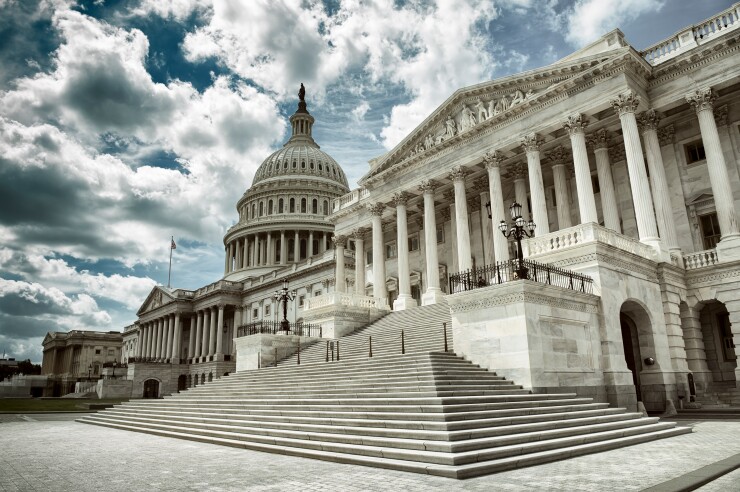Want unlimited access to top ideas and insights?
The
Vice President Harris has pushed
The other major Harris pitch is
"This is a marathon, not a sprint, so I don't think anybody should be counting on immediate relief," Killmer told National Mortgage News'
Former President Trump hasn't commented on GSE reform, but his former associates said exiting conservatorship
The GOP ticket has called for more executive influence
Read more:
The Federal Reserve and its policies have been a hot button issue for the mortgage industry.
As was long awaited, the Fed
In a survey conducted by Arizent, the parent company of National Mortgage News, the majority (53%) of
Mortgage professionals weighed in on the political influence held over the Fed. Fully 79% of respondents say the Fed takes political considerations into account when setting monetary policy, while only 15% don't agree.
Opinions differ on how the Fed's autonomy will be impacted by a new administration.
Forty-three percent of those surveyed said that the Fed, which operates independently from the executive branch, will be curtailed under a
Read more:
Read more about how the election will impact the mortgage industry.

Survey reveals mortgage professionals' thoughts on election
As the election approaches, mortgage professionals are clearly leaning towards one candidate over the other in terms of which could best help their industry.
The majority of respondents to a survey by Arizent, the parent company of National Mortgage News, said they were unhappy with the current political climate. Out of 98 respondents — including those that work in the mortgage world in the capacity of executives, management to staff — 92% said they are dissatisfied with the current political climate and only 7% said they are satisfied.
Additionally, the majority, 58% of those surveyed, say the shift of the Democratic candidate from President Biden to Harris did not change expectations for how a Democratic White House would affect the mortgage industry.
Read more:

How real estate could change post election
The upcoming election has implications for several game-changing policies that could affect companies that lend on income-producing properties and housing.
As of October 21, the presidential race and the composition of Congress were still largely a toss-up, meaning outcomes where power could be divided between the parties are possible, causing the Commercial Real Estate Finance Council to engage in projections for a range of election scenarios that could create a need for compromise. The council plans to update its analysis over time.
Read more to find out what's at stake for key policies in different scenarios, based on comments from David McCarthy, managing director, chief lobbyist and head of legislative affairs at the Commercial Real Estate Finance Council, and an analysis he co-authored with Sairah Burki, managing director and head of regulatory affairs, and James Montfort, manager of government relations. An Oct. 7 Cook Political report informed the original study.
Read more:

All about the mortgage industry's spending on lobbying in 2024
Mortgage-industry participants — including influential trade groups, insurance companies and lenders — spent $6.7 million on lobbying this year, a decrease from $12 million in 2022. The 2024 figures are based on Federal Election Commission data released on Sept. 22, 2024.
The Mortgage Bankers Association, the Council of Federal Home Loan Banks, Federal Home Loan Bank, Housing Policy Council, and Pennymac were the top spenders on advocacy this year.
Mortgage lenders and servicers including United Wholesale Mortgage, NewDay USA, Mr. Cooper, Veterans United Home Loans and Freedom Mortgage also funded advocacy efforts this year. Among these companies, Pennymac, Veterans United Home Loans and NewDay USA were the top spenders on lobbying, doling out $290,000, $220,000 and $220,000, respectively. Two years prior, Veterans United and NewDay spent $460,000 and $600,000 in lobbying efforts.
Read more:

Everything to know about the 2024 election as a mortgage professional
Presidential candidates Kamala Harris and Donald Trump have offered
"The unfortunate reality is we've got a crisis, so that's why it's being discussed,"
Vice President Harris is proposing an
Read more:
Business survey reveals how real estate investors plan to vote
The majority of real estate investors
In expressing their views on who might create the better business environment for investors, Harris, again, came out on top among 47.2% of the segment, compared to 39.2%
"It could be that investors are optimistic about the Harris campaign's initiatives focused on strengthening the housing market overall, and believe that those policies might benefit investors, tenants and homebuyers alike," CJ Patrick CEO Rick Sharga said in a press release.
Read more:

VP debate brings discussion on housing
Minnesota Gov. Tim Walz and Sen. JD Vance, R-Ohio, disagreed on the root causes of the high cost of housing in the vice presidential debate on October 1.
Walz repeatedly pressed the idea that housing should be seen as more than a commodity. "A house is more than just an asset," he said.
Vance repeatedly pinned economic issues, such as inflation, on the policies of the Biden administration and on Harris' role within that administration.
"If she wants to enact all of these policies to make housing more affordable, I invite her to use the office that the American people already gave her, not sit around and campaign and do nothing while Americans find the American dream of homeownership completely unaffordable," the senator said.
Read more:

FHFA report could lead to flood insurance compliance
An inspector general audit found the Federal Housing Finance Agency's flood insurance oversight for influential government-related mortgage investors was effective but not applied regularly enough and lacked some formal procedures, and that could have implications for how the next administration handles the issue of flood insurance
The government watchdog's report could bring more constant scrutiny to the many depository and nonbank lenders and servicers that work with the enterprises because private mortgage firms ultimately are responsible for flood insurance compliance,
"Examination procedures were inconsistent for assessing enterprises' oversight of seller/servicers' compliance with flood insurance requirements," the Office of Inspector General said in a report on the FHFA's Department of Enterprise Regulation released Thursday.
Read more:




